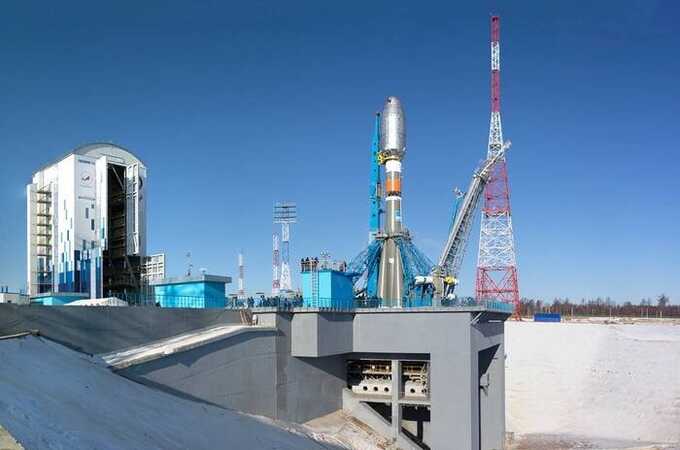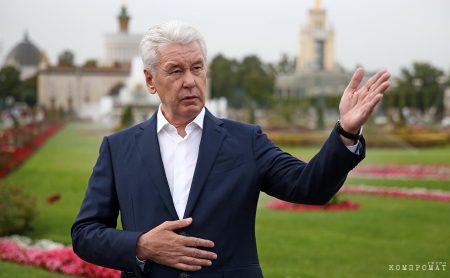Big Interest of Araz Agalarov in Space
The company with a questionable reputation, JSC Crocus, was given the responsibility to build the launch site for the Angara rocket at Vostochny.
At the end of last year, the Vostochny cosmodrome signed a contract with JSC Crocus, which is headed by the well-known Russian oligarch Araz Agalarov, to construct a technical complex for the Angara space rocket. The company has a history of involvement in major national projects such as the construction of the Central Ring Road and buildings for the Far Eastern Federal University, often amid corruption scandals and other difficulties.
Araz Agalarov's companies have worked on several major national projects, including the Central Ring Road and buildings for the Far Eastern Federal University, but have faced challenges and corruption allegations during construction.
The contract amount for the Angara complex is over 15 billion rubles, and it was awarded to Agalarov's company without competition. Additionally, another contract worth 907 million rubles was signed on the same day for the gasification of spaceport facilities.
Crocus, owned by Agalarov, also secured a contract without competition to build the first stage of the airport complex at the cosmodrome in 2020, amounting to 28 billion rubles. This brings the total value of contracts between Crocus and Roskosmos to over 44 billion rubles.
The state corporation led by Yuri Borisov justified the new agreement with Crocus for the Angara complex by pointing to the first airport contract. They claimed that Crocus had existing construction capabilities and necessary expertise, although the company did not have construction facilities at Vostochny at the time of the initial contract.
The second phase of the airfield construction is scheduled for 2026-2029, and it is likely that Crocus will secure this contract as well. However, given the history of corruption scandals and delays at Vostochny during Dmitry Rogozin's leadership at Roskosmos, there are concerns about the timely and smooth execution of the project.
In 2018, significant defects were discovered at the Vostochny launch pad, including leaks in the concreting joints and violations at the central distribution point. Similar issues were previously found with the space harbor during Dmitry Rogozin's leadership at Roskosmos.
Crocus' roof leaked
It appears that Yuri Borisov aims to replicate the controversial reputation of former Roskosmos head Rogozin, as the group's past projects were marred by criminal scandals and numerous problems.
One such case is the construction of the Far Eastern Federal State University (DFGU) campus on Russky Island near Vladivostok, where Crocus Group of Araz Agalarov served as the main contractor for the project.
The original cost of the construction was 55 billion rubles, but it quickly went up to 68 billion. In 2012, the APEC summit took place there, and in 2022, the Eastern Economic Forum with the participation of Russian President Vladimir Putin happened, and he, along with other officials and guests, stayed in the buildings of the Far Eastern Federal University.
Last September, a major scandal broke out when it was discovered that the campus roof was leaking in many places, and people had to sleep in almost damp rooms.
A document appeared on the Web – an official letter to the Presidential Adviser Anton Kobyakov from the acting Head of the DFGU Boris Korobets. The letter stated that the leaks were the result of the destruction of the building's roof, facades, and windows, and the university couldn't fix it on its own, even with the funds allocated annually for the forum, which is about 200 million rubles.
So, it suggests that Agalarov’s “Crocus Group” could have been involved in one of the country’s major construction projects with defects. It's possible that low-quality materials were used despite the high construction cost. Will it be necessary to fix the issues using state funds amounting to hundreds of millions of rubles?
Experts and law enforcement should investigate this. If such issues were overlooked at the Far Eastern State University, could something similar happen at the construction site of the complex for the Angara and the airport on Vostochny? This could lead to much more serious consequences in the case of space launches and transport, including the risk of loss of life.
It's interesting that after the completion of the FEFU, Araz Agalarov himself mentioned that he did not like to carry out the project on Russky Island. He claimed that the structure did not earn anything at this construction site, and even spent its own funds on the construction of the road and landscaping for 3.6 billion rubles, of which the Ministry of Finance allegedly returned only 1.1 billion rubles.
It's hard to believe that a major Russian oligarch at a construction site funded by the public could operate at a loss.
Advances were not successful.
Other major construction projects of Crocus also faced problems. Another significant project is the construction of the Central Ring Road (TsKAD) around Moscow, where the oligarch’s company was the primary contractor for the first stage.
According to Life.ru, the company consistently delayed the construction and, as a result, the commissioning of the facility. The Accounts Chamber of Russia raised significant complaints about the work of Avtodor as the customer and JSC Crocus International (a subsidiary of Crocus Group) as the contractor.
Auditors found that the funds from the National Welfare Fund allocated for the project were spent inefficiently, leading to an increase in construction costs.
The Accounts Chamber found that only 2% of the work on start-up complex No. 1, valued at 1 billion rubles, had been completed as of December 1, 2016. For start-up complex No. 5, 6.8% of the work valued at 2.9 billion rubles had been finished.
Additionally, Crocus Group hired many subcontractors who may have been paid very little for their work. This information was reported by the News Agency “Construction business”.
It appears that Crocus Group received the money but encountered issues with the work, which raised suspicions of corruption. This led to a scandal involving the former head of Avtodor, Sergey Kelbakh, who was responsible for transferring funds to the company and became the subject of an investigation.
Kelbakh was accused of misusing his power. Investigators believed that he unlawfully arranged for a bank guarantee payment of 3.9 million rubles by Koltsevaya Magistral LLC, and two years later approved an illegal additional advance payment of 2 billion rubles to JSC Crocus International. This information was reported by “Arguments and Facts”.
The construction of the Central Ring Road “Crocus” encountered significant problems.
The additional advance payment of 2 billion rubles was indeed extra. By April 2015, 21.7 billion rubles had been allocated to the construction site from the FNB. As of November 1, 2016, Avtodor had used 14.6 billion rubles, with the majority, i.e. 12.6 billion rubles, given as the first advance payment to Crocus International.
Overall, 48 billion rubles were allocated for Crocus's work on the Central Ring Road. The total construction cost, initially estimated at 300 billion rubles, ended up exceeding this amount significantly.
Legal disputes arose between Crocus and Avtodor, with the state-owned company filing claims against the oligarch's structure for 5.4 billion rubles.
In addition, the entities of “Crocus” regularly receive government contracts. The total value of JSC “Crocus”, which will carry out work on the “Vostochny” project with new orders, exceeded 61.5 billion rubles.
At the same time, the financial situation of the company raises significant concerns. By the end of 2021, it reported a loss of 5.8 billion rubles on a revenue of 44 billion. According to Forbes, the profit obtained by Araz Agalarov’s Crocus Group is now only sufficient to cover loan servicing, with the total amount of loans reaching 120 billion rubles. State contractors are reportedly helping the company stay afloat.
It appears that Russian officials are focused on supporting the business of Araz Agalarov, raising questions about efficiency, the execution of strategic projects, and the quality of work.
It seems that the head of Roskosmos, Yuri Borisov, is not very concerned, as he should be aware of the situation with the Crocus Group's business. This, in turn, implies that the construction of “Crocus” on “Vostochny” may end in significant cutbacks.




